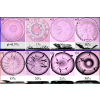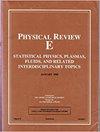干燥二氧化硅胶体沉积物分层促进径向和环向裂纹的形成机理
IF 2.4
3区 物理与天体物理
Q1 Mathematics
引用次数: 0
摘要
在自然界和工业领域中,具有径向和环形图案的裂纹十分常见。尽管对裂纹的形态和传播条件进行了广泛研究,但沟道断裂和界面分层相互作用形成裂纹的机理仍未阐明。在此,我们通过胶体体积分数的相关性,介绍了当软硬基底上的胶体沉积厚度超过临界值时,径向裂纹向径向裂纹和环向裂纹并存转变的过程。此外,还根据二氧化硅胶体沉积物的半径和体积分数,构建了从径向裂纹到径向裂纹和圆形裂纹共存的厚度相关相图。建立了一个相场断裂模型,以阐明同时分层如何促进了径向裂纹的形成。条状沉积物底面由翘曲引起的径向拉伸应力与厚度成正比。它导致厚沉积层中圆形裂纹的成核和生长。这项研究深入揭示了干燥胶体沉积物中复杂裂纹模式的形成机制,并彻底改变了基于裂纹的微纳结构的设计空间。本文章由计算机程序翻译,如有差异,请以英文原文为准。

Formation mechanism of radial and circular cracks promoted by delamination in drying silica colloidal deposits
Cracks with radial and circular patterns are appealing in nature and industry. Although morphologies and propagation conditions of cracks are extensively studied, the formation mechanism of crack pattern by the interaction of channel fracture and interfacial delamination remains elusive. Here, we present the transition of radial to coexisting radial and circular crack patterns when the thickness of colloidal deposits on both hard and soft substrates exceeds a critical value, through the colloidal volume fraction dependence. In addition, a thickness-dependent phase diagram from radial crack to coexistence of radial and circular cracks was constructed with respect to the radius and the volume fractions of silica colloidal deposits. A phase-field fracture model is developed to elucidate how the formation of radial cracks is facilitated by simultaneous delamination. The warping-induced radial tensile stress at the bottom surface of the striped deposit is proportional to the thickness. It leads to subsequent nucleation and growth of circular cracks in thick deposits. This work provides insight into the formation mechanism of complex crack patterns in drying colloidal deposits and revolutionizes the design space of crack-based micro-nano structures.
求助全文
通过发布文献求助,成功后即可免费获取论文全文。
去求助
来源期刊

Physical review. E
物理-物理:流体与等离子体
CiteScore
4.60
自引率
16.70%
发文量
0
审稿时长
3.3 months
期刊介绍:
Physical Review E (PRE), broad and interdisciplinary in scope, focuses on collective phenomena of many-body systems, with statistical physics and nonlinear dynamics as the central themes of the journal. Physical Review E publishes recent developments in biological and soft matter physics including granular materials, colloids, complex fluids, liquid crystals, and polymers. The journal covers fluid dynamics and plasma physics and includes sections on computational and interdisciplinary physics, for example, complex networks.
 求助内容:
求助内容: 应助结果提醒方式:
应助结果提醒方式:


